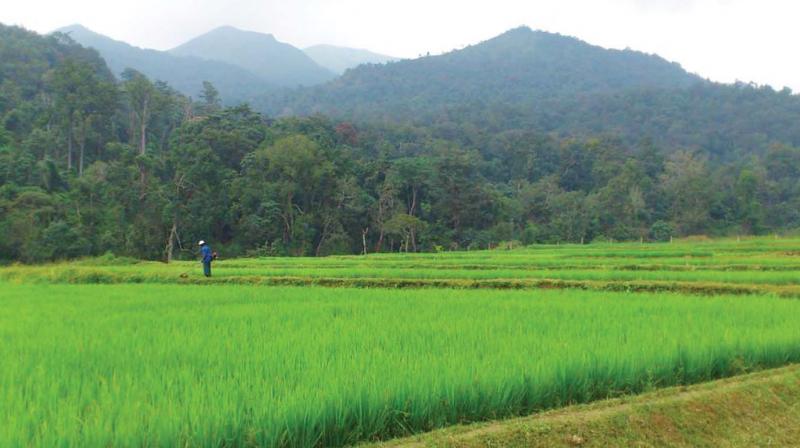This is no doubt a one-stop point for anyone wishing to gather information on organic farming.

Nature lovers, Satish Gowda and his wife Ganavi, both post-graduates in Coffee Quality Management from Coffee Board of India, are on a mission to promote organic farming in Chikkamagaluru. The farm maintained by Satish has inspired many to set-up organic farms on the same lines. It’s not only organic farming for which the farm has become famous, it is also the abode for numerous birds and grazing animals which go in search of fruits. Photographers love the place as they can easily sight the birds which perch on trees. The Organic farmers association has done its bit to popularise the spot by bringing foreign national to have a close look at the farm and learn the tenets of organic farming. M.B. Girish explores this unique farm which is any nature lover’s delight
The future is organic and who would know this better than Satish Gowda, a honorary wildlife warden in Chikkamagaluru and his wife Ganavi, who hails from a family of coffee planters? Their painstaking efforts spread across eight years, has created an eco-lovers’ paradise at Honnala village, Sirivase post in Chikkamagaluru where they have converted an area covered with wild shrubs into a lush green expanse by cultivating about a 1,000 fruit bearing trees. This is no doubt a one-stop point for anyone wishing to gather information on organic farming.
Organic farming is not all that this farm boasts of, it is also a bird lovers’ hallowed spot where they can film rare species which have made the farm their home.
Temple Tree Farm is spread across 7.15 acres and has a variety of fruit bearing trees including some from foreign countries which attract birds, butterflies and herbivores from the neighbouring Bhadra Tiger Reserve located on the banks of River Somavahini.
Satish and Ganavi were inspired to set up their organic farm after a visit to Navadarshanam, an eco-ashram in Bengaluru. They met Ananthu and his wife Jyothi and were inspired by their eco- sustainable way of living.
To make their dream of setting up an organic farm come true, Satish and Ganavi purchased land at Sirivase in 2011 and named it Temple Tree Farm because a Temple Tree is located right at the entrance of the farm.
The farm uses solar energy to pump water to every nook and corner and has several varieties of fruit bearing trees such as Rambutan, Java apple, mulberry, rose apple, pineapple, rampala, seethapala, lakshmanpala, hanumanthpala, papaya, cashew, guava, jack fruit, velvet apple, peach, carambola, kokum, avocado, chikoo, orange, musambi, mango, litchi, pomelo and mangosteen. Among the fruits grown at the farm, the Nakkare variety is unique as it should be eaten raw and not ripe as it tastes sweeter. Nakkare is used to make pickles and chutney.
Observing that many varieties of birds come to the farm to feed on the fruit, Satish Gowda has engaged a naturalist, Shivakumar of Chikkamagaluru to study the various species of birds and butterflies and make a note of it for documentary purposes. Shivakumar says he has sighted about 60 species of birds in the last three years including the Grey Hornbill, Malabar Trogon, Rocket Tail Dragon, Blue-fly Catchers, Asian Paradise Fly Catchers and Ruby Throated Bulbul among others. The fruits at the farm are not harvested to allow the visiting birds feast on them.
“I even see Otters in River Somavahini flowing close to the farm, the other place I get to see Otters is in the Bhadra backwaters,” says Shivakumar. Another rare species he has seen at the farm is the Flying Lizard. “I read about the Flying Lizard in writer Poornachandra Tejaswi’s book and was lucky to spot it at Satish’s farm.”
The farm is also frequented by gaur, deer, elephants and sometimes tigers and leopards which leave their pug marks.
Malnad Gidda, an indigenous cow was added to the farm and dung and urine from the cows are being used as plant nutrients and pesticide. Satish says milk from Malnad Gidda is highly nutritious and has medicinal properties. A fish pond is an artificial tank to collect rain water as the region receives copious rainfall during the monsoon. The pond has stocks of fish varieties such as Gowri, Rohu and Katla.
The chicken are fed paddy and dry paddy hay is used as fodder for cows. Goats and cows are also fed green grass. No dry fodder is bought from outside. Honey boxes are kept around the farm and help in a collection of over 25 kg of honey in a year.
Ganavi says visitors to the farm are amazed how an empty piece of land was transformed into a fully functional farm. Taking a cue from Satish Gowda, Partasarthy Wodeyar, a resident of Salagame hobli near Hassan city, is developing an eco-farm on the lines of Temple Tree Farm. He also plans to start an eco-tourism centre in an area of four acres and wants to serve organic food to visitors.
“I learnt a lot from Satish Gowda’s farm. It is difficult to maintain a farm like his and the effort put in by Gowda is worth appreciating,” he says.
Satish being an honorary wildlife warden, is also rendering a helping hand in mitigating human-animal conflict in and around Bhadra Tiger Reserve. He offers compensation for cattle killed by tigers or leopards. Besides, Anti-Poaching Camp personnel are given torches, water repellent coats and other accessories to enable them guard the forest areas from smugglers or poachers.
source: http://www.deccanchronicle.com / Deccan Chronicle / Home> Nation> Current Affairs / by M B Girish, Deccan Chronicle / May 19th, 2019

